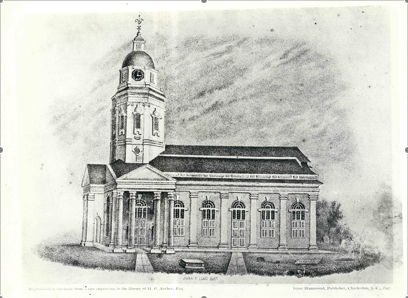In a way, early South Carolina re-created itself while adhering to many similar customs of England’s parliament. The economy of the newborn colony was based on the amount of property that one owned. Correspondingly, Carolinians adapted a hierarchical system also similar to England’s. People who had material wealth ended up being the richest and most respected citizens in society. The most striking difference between England and South Carolina’s premature colony is the equality that was shared between men and women. Unlike many other cultures in the eighteenth century, women in South Carolina had the ability to claim as much land as men did. Some females who were born into wealth even inherited equal amounts of property when and if their parents died at a relatively early age (Sadly, the death rate was pretty high during this time in SC, so this seemed to happen more often than not). Weir notes our city, Charles Town as a “commercial city” more than once, and claims that it was completely “possible for a married woman in trade to control her own property and business as a female sole” (233). Independent women such as Mary Beth Norton, Sarah Rhett, and Eliza Lucas Pinckney heightened the status of women by taking on positions that juxtaposed men. However, the relationships between men and women maintained the conservatism that was practiced in England, with the same amount of indecencies as well. Similar to how our society operates today, some marriages worked well while others did not. The largest difference between then and now is, divorce was not an escape plan like it has become today. Getting on to more details of South Carolina’s society, let’s briefly talk about the notorious culture of the colony.
Robert Weir quotes the observation of some historic Revolution visitors when they first came to South Carolina: “State, magnificence and ostentation, the natural attendants of the riches, are conspicuous among the people” (236). Apparently, South Carolina, and especially Charles Town, was a world that thought it was glorified with material wealth, and that they should exploit it. Some even believed that their fortune was a divine gift. The way that Weir depicts Carolina’s religious life is also particularly interesting. Though the majority of South Carolinians were Anglicans who sought to control all unruly emotions, Weir makes it a point to talk about how casual the churches were, and how people talked nonstop in the midst of almost all congregations. This was another aspect that separated South Carolina from the conventions of English religion. What was also distinct about the colony’s culture was their musical appreciation. According to Weir, “Charles Town was equally noted for its music” (239). Sounds like Carolina was one of the very few places in America where music was appreciated by a wide range of audiences- many that all classes of people were welcomed to enjoy and perform public music. The most famous musical festivities were held by the St. Cecelia Society, which was founded in 1762 and is the oldest musical society in the United States! Some musical gatherings became a bit more private than clubs like St. Cecelia’s, but overall music in South Carolina acculturated a common taste within various ethnic groups. To some, musical knowledge was the premise to a higher education; the access to higher education, on the other hand exhibited more complicated terms than music.

St. Phillip’s Church is where Robert Weirs claims old South Carolinians would gather for religious services in a casually social manner.
Education was not free to all. Public education wasn’t an ordinary routine in one’s life like it is for our generations. Weirs mentions that children who came from elite families were granted the right to an education, and poor families often had their children performing hard occupational labor rather than intellectual labor. Weir also gives us a clipping from a newspaper in 1730 that read, “better a good cobbler than a poor scholar; not every shopkeeper’s son should aspire to be a gentleman”(252). Even though married women seemed to have a lot of dignity to uphold in society, men had an easier time getting educated. Nevertheless, this did not stop some people, like Eliza Pinckney, from making a name for themselves. Once people in South Carolina really started investing in their education, they began to carry on more ideals that were prevalent in England at the time. For instance, the liberation of free will, and the power of the individual- two elements that help to define the Great Awakening, were ingraining the minds of South Carolinians as well. Contributors to the colony agreed that man must have a proper education and a grounded idea of themselves before they could begin to control businesses or trade and purchase land as an honorable citizen in society. All in all, personal independence, determination, and pride for one’s nation became foundations for a colony that has grown into a traditional Southern home.
Comments are closed.